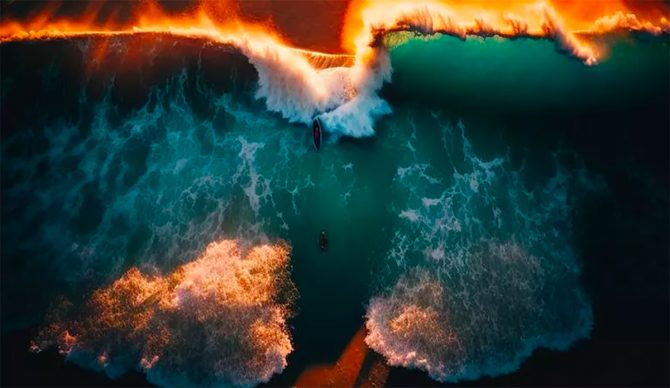
Anything but real. Photo: Absolutely AI
Recently, I wrote a piece investigating the ever-changing role drones play in the world of surf photography. My conclusion, that perhaps they do not deserve the same type of respect as human-operated styles of shooting, such as cameramen on land or swimming in the water, was met with backlash. People argued that improvements to technology mean higher quality photos, and higher quality photos are… better. And by that logic, the highest quality photo would be the best one. Right?
As it turns out, there’s no need to propose the hypothetical, because this situation played out in real time. A Sydney-based AI studio known as Absolutely AI recently won first place in an Australian photo competition. The only caveat is that the winning photo, a stunningly vibrant aerial photo of a surfer riding a wave at sunset, wasn’t a photo at all. The picture was of course AI-generated. In reality, there was no wave or sunset that was ever captured. It all took place in the digital realm, behind computer screens, in a world no human, let alone surfer, has access to.
The image itself is perfect (it was literally the product of a robot) and so it likely looked more appealing than many of the photos taken by real people. But does this high-quality image speak to surfers’ souls? Does it spark the urge to sell everything and travel to a remote break? Does it remind you of the time you scored a spot to yourself at sunset? Probably not.
My argument here, certainly, stems from the assumption that surf photography aims to complete the function of documenting surfing. I would define the function of surf photography as being a visual representation of what surfing is. And that, of course, is tricky, because surfing means different things to different people. And still others could argue that surf photography does not solely exist for the surf community. Perhaps, for example, the AI-Generated image spoke to non-surfers and stirred an emotional response from art critics. This is a valid argument. But I would argue that surfing exists in the real world. It happens here and now. Not in the metaverse.
A similar philosophical argument concerns the nature of reality, asking, “why does it matter if experiences happen in the physical world? So what if they are the product of chemicals in our brains or drugs producing altered states of consciousness?” Our perception and feelings of these lived experiences may be the same, but the physical experience is not.
Another way to conceptualize this problem is by doing a quick thought experiment. In 1989, philosopher Robert Nozick proposed a thought experiment called “The Experience Machine” in his book The Examined Life. The experiment supposes that you have a choice: to live in the real world, as you are living right now, and continue to have those experiences. Or, you can choose to plug into a machine that simulates your life exactly how you want it: all of your dreams and desires feel as real as any other experience to you.
Nozick writes, “You can experience the felt pleasures of these things, how they ‘feel from the inside.’ You can program your experiences for the rest of your life. If your imagination is impoverished, you can use the library of suggestions extracted from biographies and enhanced by novelists and psychologists. You can live your fondest dreams ‘from the inside.’ Would you choose to do this for the rest of your life? Upon entering you will not remember having done this; so, no pleasures will get ruined by realizing they are machine-produced.”
Interestingly, Nozick imagines most people would choose reality over a machine-produced paradise, even though the two experiences feel the same. Might this suggest there is more to life than how it appears to us? Do we value meaning over pleasure?
This thought experiment provides insight into your inclinations about how we may best approach real surf photos. We are asking the same questions about the nature of photography as we are about the nature of existence. How much does it matter if a photo is “real?” What do we value here? Meaning, or pleasure? Then again, maybe surfers aren’t the best people to ask.

